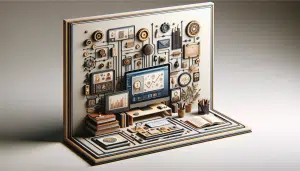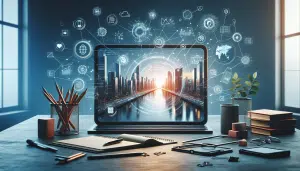Hidden Ways You Benefit from Lifelong Learning
Lily Carter November 2, 2025
Unlock how lifelong learning shapes your future, boosts career growth, and impacts society in subtle but powerful ways. Explore the real-world benefits, flexible pathways, and social changes connected to continuing education at every stage of life.
Lifelong Learning Shapes Individual Success
Lifelong learning is an approach to personal and professional development that never stops. Whether formal or informal, this mindset encourages individuals to keep updating their knowledge and abilities—well beyond traditional schools and colleges. What makes lifelong learning unique? Its flexibility. Individuals may learn through online courses, community programs, workshops, or even collaborative projects with others. Skills-based credentials are part of this journey, often serving as proof of one’s commitment to growth and employability.
Why do so many people invest time in lifelong learning? It opens doors. Many who upskill or reskill find broader career options and often greater earning potential. In sectors like technology, healthcare, and business, new certifications or micro-credentials help professionals keep pace with rapidly evolving fields. This adaptability ensures resilience in changing job markets. In fact, employers are increasingly seeking candidates who show evidence of continuous self-improvement, not just fixed degrees.
But the rewards go further than just salary. Lifelong learning often builds self-confidence, strengthens problem-solving skills, and enhances adaptability to unexpected situations. Whether you are navigating new technologies or pivoting to a different industry, these learning experiences foster growth for all stages of life. The journey never really ends; it’s about feeding curiosity and preparing for new opportunities. Guidance from workforce development agencies, vocational schools, and digital platforms makes these resources even more accessible for people with diverse backgrounds and ages (https://www.bls.gov/careeroutlook/2019/article/lifelong-learning.htm).
Digital Credentials and Alternative Pathways Transform Access
The explosion of digital learning has made it easier to earn micro-credentials, certificates, and badges. Many recognized institutions now offer these programs fully online. EdTech platforms, such as Coursera and edX, collaborate with universities to deliver practical, career-aligned content. Micro-credentials verify the skills gained in fields like coding, business management, and data analytics. Completion can be displayed on resumes and social profiles, turning learning into opportunity.
Traditional degrees are no longer the only credentials with value. Today, learners can stack short certificates, combine workshops, or mix informal and structured learning paths. This open framework supports adult learners and career changers, allowing them to tailor progression to their own pace and needs. Many individuals choose modular learning for its focus, affordability, and immediate relevance. These digital pathways offer stepping-stones—sometimes leading to degree programs, but often valuable all on their own.
Organizations increasingly recognize these alternative credentials. Job postings may mention specific certifications or skills-based evidence, inviting candidates with diverse educational backgrounds to apply. Human resources teams use verifiable badges and blockchain-powered records to quickly verify what an applicant knows or can do. This flexibility broadens the talent pool and supports social mobility, helping people at different life stages (from recent graduates to retirees) access ongoing opportunities (https://www.educationandemployers.org/research/understanding-alternative-education-pathways/).
Society Evolves: The Ripple Effects of Ongoing Education
Lifelong learning does more than help individuals—it influences entire communities and economies. When people continue to develop skills, innovation rises. Local economies benefit from workers who bring fresh knowledge to family businesses, startups, or civic projects. These boosts can be seen in entrepreneurship rates and the adoption of new technologies across multiple sectors. Societies that value adult education tend to have lower unemployment and higher productivity rates.
There’s a strong link between ongoing education and improved civic engagement. Adults who pursue new learning opportunities often volunteer, participate in community groups, or lead local initiatives. Health literacy increases as well, with lifelong learners better equipped to navigate healthcare systems and make informed decisions for themselves and their families. The impact extends to children, as adult learners model curiosity and perseverance, fostering similar habits in the next generation.
Educational equity is another benefit. When nontraditional pathways gain recognition, people who may have missed out on college—due to cost or circumstance—find new chances to advance. Libraries, nonprofit organizations, and open universities are vital in supporting this broader participation, offering free or low-cost programs and outreach. Societal attitudes toward education shift, valuing not just diplomas, but the desire to learn itself (https://www.oecd.org/education/innovation-education/47515217.pdf).
Barriers and Bridges: Affordability, Motivation, and Access
Despite these benefits, barriers to lifelong learning still exist. Financial constraints remain a common challenge, especially for adults balancing work and family life. Program fees, technology costs, and lost wages can make continued learning difficult to justify. However, many organizations are exploring solutions—such as scholarships, employer tuition assistance, and sliding-scale program fees—to close the affordability gap for diverse learners.
Another obstacle is time. Many adults struggle to find space for coursework among daily commitments. Flexible scheduling, asynchronous modules, and tailored program designs help address these hurdles. Online learning stands out as a practical solution, letting individuals access materials and complete requirements anywhere, often at their own pace. Support networks and mentorship programs further motivate learners, creating a sense of belonging and accountability within digital communities.
Geography and infrastructure play a role as well. Rural communities and underserved regions may lack high-speed internet or access to tutoring and career support. Partnerships between libraries, community centers, and private companies help fill these gaps, bringing learning resources closer to home. National and local policy efforts often seek to expand broadband and upgrade public learning facilities as a means of bridging digital divides. Small steps build more equitable access over time (https://www.luminafoundation.org/wp-content/uploads/2017/08/lifelong-learning.pdf).
Lifelong Learning Boosts Brain Health and Personal Well-Being
Learning isn’t just about careers. Neuroscience suggests that continuous education helps to keep the brain healthy as people age. Challenging the mind with new skills, languages, or creative arts can slow cognitive decline and sharpen memory. Reading widely, taking up musical instruments, or learning coding later in life all contribute to vibrant mental health and a sense of accomplishment.
Adult learners who stay mentally active report greater life satisfaction and resilience against stress. The sense of achievement from mastering new material or completing a program provides intrinsic motivation. For many, this journey creates opportunities to make new social connections, reducing isolation and reinforcing community. Group studies, online forums, and alumni associations can provide encouragement and lasting friendships.
Researchers have found that continued education is connected to greater health literacy too. Adults who pursue learning into their 50s, 60s, and beyond are more likely to adopt healthier habits, follow medical recommendations, and navigate complex health systems with confidence. This broad understanding benefits families and communities as well, making education a public good as much as a private one (https://www.cdc.gov/healthliteracy/research/index.html).
How to Build Your Personalized Learning Journey
Creating a lifelong learning plan is personal and dynamic. Some people begin with online courses in their interests or professions; others explore local workshops, lectures, or reading circles. Start by identifying your learning goals, then look for flexible formats that fit your schedule and budget. Self-paced programs work best for some, while others thrive with traditional class structures or group projects. The right approach will be unique to each individual.
Making learning a regular part of life—just like exercise or healthy eating—rewards consistency. Begin with small commitments: a short course, a weekly book club, or a new hobby. Over time, layer on more advanced projects, experiment with cross-disciplinary subjects, or participate in mentorship, both as a learner and as a guide for others. Monitoring progress and celebrating milestones reinforces positive habits and the desire to continue pushing boundaries.
Remember, there’s no single correct path. The world of education is more customizable than ever, supporting all ages and experience levels. Whether aiming to switch careers, pursue passion projects, or simply stay sharp, lifelong learning is accessible to everyone. Try new subjects. Reach out for support when needed. The most important step is getting started and maintaining curiosity along the way (https://www.coursera.org/articles/what-is-lifelong-learning).
References
1. U.S. Bureau of Labor Statistics. (n.d.). Lifelong learning helps adults adapt to change. Retrieved from https://www.bls.gov/careeroutlook/2019/article/lifelong-learning.htm
2. Education and Employers. (n.d.). Understanding alternative education pathways. Retrieved from https://www.educationandemployers.org/research/understanding-alternative-education-pathways/
3. OECD. (2011). Innovative learning environments. Retrieved from https://www.oecd.org/education/innovation-education/47515217.pdf
4. Lumina Foundation. (2017). A quick start guide to lifelong learning. Retrieved from https://www.luminafoundation.org/wp-content/uploads/2017/08/lifelong-learning.pdf
5. Centers for Disease Control and Prevention. (n.d.). Research on health literacy. Retrieved from https://www.cdc.gov/healthliteracy/research/index.html
6. Coursera. (n.d.). What is lifelong learning? Retrieved from https://www.coursera.org/articles/what-is-lifelong-learning







